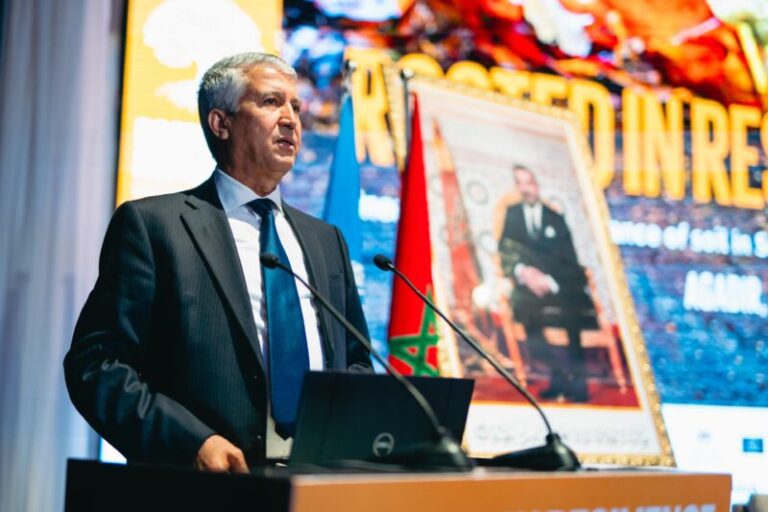The Minister of Agriculture, Maritime Fisheries, Rural Development, and Water and Forests, Mohamed Sadiki, highlighted Morocco’s active role in the field of biospheres on Monday in Agadir.
Speaking at the closing of an international conference initiated by the United Nations Educational, Scientific and Cultural Organization (UNESCO) and the National Agency for the Development of Oasis Zones and Argan Trees (ANDZOA) under the theme “Rooted in Resilience: Discovering the Importance of Soil in Sustainable Development,” Mr. Sadiki noted that this event reinforces Morocco’s commitment to the conservation of natural resources, sustainable development, and improving the relationship between humans and the natural environment.
“The choice of Morocco to host this meeting reflects the international community’s recognition of the Kingdom’s active role in the field of biospheres, under the enlightened leadership of His Majesty the King,” he stated during this closing session, which was enhanced by the presence of UNESCO Director-General Audrey Azoulay, along with a host of personalities, experts, and international researchers in the field.
In this regard, he pointed out that the Kingdom currently hosts four biosphere reserves recognized by UNESCO, including the Arganeraie Biosphere Reserve, the Southern Morocco Oasis Biosphere, the Intercontinental Mediterranean Biosphere, and the Atlas Cedar Biosphere.
Referring to the 36th Session of the International Coordinating Council of the Man and the Biosphere (MAB) Programme, which will begin on Tuesday in Agadir, the minister emphasized that Morocco is “a country that, through its biological and cultural diversity, offers an exceptional ground for experimentation and innovation for this program.”
“Since its accession to the MAB program, Morocco has fully committed to the protection of its ecosystems, which are living laboratories where innovative practices for the management of natural resources, adaptation to climate change, and the promotion of environmental education are developed,” he explained, noting that the sustainable management of natural resources becomes a lever for inclusive development in the face of climate challenges.
Morocco, he continued, has also successfully integrated the objectives of the MAB program into its national policies, particularly the strategic orientations of the Lima Declaration, thus expressing a strong desire to reconcile nature conservation and human development.
For Mr. Sadiki, this involves a synergy and convergence of efforts among public institutions, local authorities, researchers, NGOs, and local communities, highlighting the agricultural, forestry, and rural development strategies that have been implemented, which play a key role in this dynamic.
“We have established sustainable agricultural policies aimed at improving the entire agricultural value chain while ensuring the preservation of natural resources and strengthening the agricultural resilience of rural areas and their communities in the face of climate challenges,” he asserted, highlighting the “Green Generation 2020-2030” and “Forests of Morocco 2020-2030” strategies.
Similarly, Morocco has made significant progress in water resource management and reforestation, Mr. Sadiki emphasized.
“We have undertaken ambitious initiatives to restore degraded ecosystems through reforestation programs and watershed management, thus contributing to the fight against soil erosion and desertification. In partnership with various stakeholders, we have launched structural programs with projects aimed at protecting and restoring natural habitats,” he said.
Furthermore, particular attention has been given to applied scientific research, education and training, and strengthening the capacities of actors and local communities, he added.
Regarding efforts to mitigate and adapt to climate change and strengthen the resilience of ecosystems, the minister reported colossal investments primarily focused on managing irrigation water, its conservation, and mobilization from non-conventional sources, notably seawater desalination for irrigation, while mitigation efforts have involved expanding plantations to increase carbon sequestration potential and reduce greenhouse gas emissions.
“All these efforts integrate the realization of Morocco’s international commitments, particularly within the framework of the United Nations Framework Convention on Climate Change, the Convention on Biodiversity, the Paris Agreement, and the 2030 Agenda concerning the United Nations Sustainable Development Goals (SDGs) aimed at eradicating poverty, protecting the planet, and ensuring prosperity for all,” he noted.
And the minister added: “Sustainability is no longer a trend but the logical and necessary path towards improving the living conditions of populations and the prosperity of states.”


